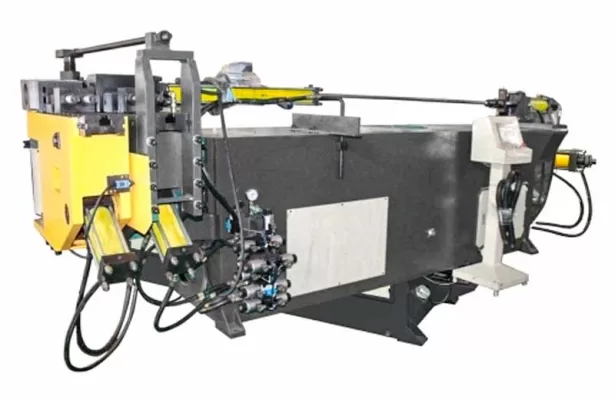The Versatility of Pipe Bending Machine
Pipe bending machines have become essential tools in many different industries in today's fast changing industrial landscape because of their exceptional versatility while handling a wide range of materials.
In this article, we will explore the materials that can be bent with pipe bending machines and the various industries that depend on these equipment for their operations
Materials for Pipe Bending Machines
Pipe bending machines can bend a wide range of materials, each with special characteristics and challenges. To get the desired results in various applications, it is essential to understand the materials that can be bent using pipe bending machine.
Steel: Because of its strength and longevity, steel is one of the materials used in pipe bending the most frequently. However, bending steel pipes can be difficult because deformations or cracks must be prevented by carefully controlling the bending process. Depending on the needed strength and corrosion resistance, different types of steel, such as carbon steel, stainless steel, and alloy steel, are utilized in different applications.
Stainless Steel: Since stainless steel resists corrosion and has a pleasing appearance, it is also a popular choice for pipe bending. It is frequently utilized in sectors like food processing, aerospace, and automobiles. But when bent, stainless steel has a propensity to work harden, which makes it harder to bend precisely without breaking or distorting. When working with stainless steel pipes, proper bending techniques are crucial.
Aluminum: Aluminum is a lightweight and corrosion-resistant material that is frequently used in the building, automotive, and aerospace sectors. Compared to steel, it is reasonably easy to bend, but you have to be careful not to bend it too much as this might lead to fractures or splits. Aluminum pipes are frequently utilized in components for automobiles and aircraft where weight is an important consideration.
Copper: Because of its exceptional conductivity, copper is widely utilized in HVAC, electrical, and plumbing applications. It does not work harden as quickly as stainless steel and is reasonably easy to bend. However, care must be taken to employ the proper bending techniques because incorrectly bent copper pipes are prone to kinking.
Brass: Due to its resistance to corrosion and beautiful qualities, brass is a material that is highly prized. It is frequently utilized in plumbing, architectural, and furniture applications. Although brass pipes are easily bent, excessive bending should be avoided as this might result in cracks or deformations.
Industries that Use Pipe Bending Machines
Pipe bending machines are essential to many different industries because they can form pipes to meet precise specifications for a range of uses. In the following, we introduce several major industries:
Automotive Industry
Pipe bending machines play a major role in the automotive sector by fabricating exhaust systems, fuel lines, and hydraulic systems. To guarantee that pipes fit properly and operate well in cars, these devices are used to precisely bend pipes. The performance and efficiency of automotive systems can only be maximized by having the ability to bend pipes into various shapes.
Aerospace Industry
Pipe bending machines are used in the aerospace sector to make pipes for aircraft air conditioning, hydraulic, and fuel systems. To make sure that they can survive the harsh flying conditions, these pipes need to adhere to stringent quality standards and exact specifications. With the use of pipe bending machines, manufacturers can produce sturdy and lightweight pipes that satisfy the exacting specifications of the aerospace sector.
Construction Industry
Pipe bending machines are used in the construction industry to make pipes for structural, HVAC, and plumbing applications. For these pipes to fit together correctly and adhere to building requirements, they must be bent precisely. Whether it's a large-scale commercial project or a residential building, pipe bending machines enable the fabrication of specialized pipes that match the unique requirements of each construction project.
Furniture Manufacturing
Pipe bending machines are utilized by the furniture manufacturing industry to fabricate frames for various furniture items, such as tables and chairs. Using straight pipes would make it difficult or impossible for manufacturers to build elaborate and fashionable designs. These machines can solve this problem. With the use of pipe bending machine, furniture makers can produce distinctive and creative designs that distinguish their goods from the competition.
Challenges in Pipe Bending
Pipe bending machines are useful devices, but they are not without difficulties. Preserving the integrity of the pipe is one of the primary issues in pipe bending. When a pipe is bent, the outside radius stretches and the internal radius is compressed. This may result in the pipe wall being thinner, particularly if the material is steel.
Mandrel bending and heat induction bending are two methods that manufacturers utilize to keep the pipe from thinning and preserve its integrity. In order to lower the chance of thinning, mandrel bending uses a mandrel inside the pipe to support the walls during bending. By applying heat to the pipe before bending it, heat induction bending facilitates shaping without inflicting damage.
Reaching the appropriate bend radius and angle is another difficulty in pipe bending. The bend radius and angles needed for various applications vary, therefore exact control over the bending process is crucial. Computer numerical control (CNC) technology is used by modern pipe bending machines to achieve accurate bends, guaranteeing that every pipe fits the necessary standards.
Conclusion
In summary, pipe bending machines are incredibly versatile and can work with a wide range of materials, including steel, stainless steel, aluminum, copper, and brass. This versatility is demonstrated by the fact that they are used in a variety of industries, including construction, automotive, aerospace, and furniture manufacturing.
As technology advances, pipe bending machines continue to evolve, offering new capabilities and features that allow manufacturers to create increasingly complex and innovative designs.
